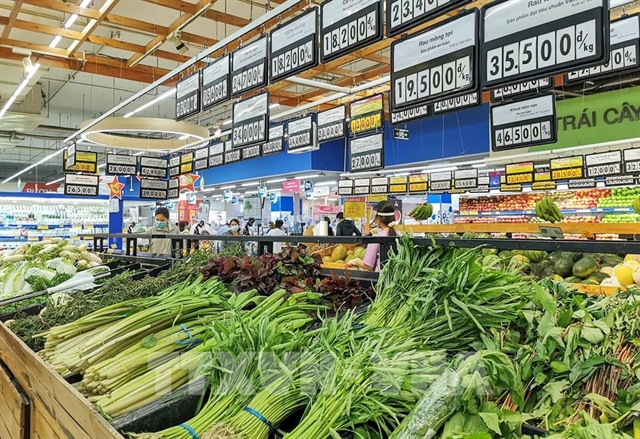The rising incidence of COVID-19 has led many localities in the Cuu Long (Mekong) Delta region to adopt social distancing.

The rising incidence of COVID-19 has led many localities in the Cuu Long (Mekong) Delta region to adopt social distancing.
Business activity has shrunk dramatically but consumers have been buying and stockpiling food, resulting in a shortage of certain products and pushing up their prices.
After the An Giang Province People's Committee announced social distancing under Directive 16 in nine districts and city for 10 days from July 15, people rushed to buy goods.
The day before at Long Xuyen Market the prices of many vegetables shot up. For instance the price of a kilogramme of bottle gourd quadrupled to VND44,000.
Nguyen Minh Hung, director of the provincial Department of Industry and Trade, told Tuoi Tre online that this happened because people in some places were worried.
"We have plans in place to ensure steady supply of goods. Currently goods are being transported to traditional markets."
In Can Tho City, which announced Directive 16 in Ninh Kieu, Cai Rang and Binh Thuy districts and Directive 15 in other places from July 12, 64 out of 105 traditional markets are closed. The difficulty in transporting goods from outside has also affected supply of goods in recent days.
A resident of An Khanh Ward in Ninh Kieu said since July 12 he has had to get up early every day to buy food, but has to go to three or four places before finding all necessary items such as meat, vegetables and eggs.
Most places do not have enough poultry eggs to meet demand, he added.
A resident of An Binh Ward said she bought 20 duck eggs from a seller on Facebook for VND80,000, while it was only VND60,000 earlier.
An employee at a Satra convenience store on Nguyen Van Linh Street, Ninh Kieu District, said pork and vegetables used to be available at his store until evening, but not since July 11 when they are sold out at 8am.
The situation is similar in Hau Giang Province, where Directive 16 is in place in Long My town’s Long Phu Commune since July 13.
Traditional markets and supermarkets have been crowded with shoppers coming to buy mainly items such as rice, instant noodles, milk, packaged foods, vegetables, fruits, and meat.
At traditional markets many sellers said they sell out much earlier than before.
Tran Thi Nhu Lan, who sells agricultural products at the market, said: "Gourds, melons, squash, and pumpkins are in high demand. Each customer buys two or thrice times the usual volume, and so I sell out goods pretty early.”
This high demand means the prices for agricultural goods at traditional markets have shot up, especially those transported from other provinces, according to traders.
Nguyen Van Tham, deputy director of the Hau Giang Department of Industry and Trade, said the pandemic has had a significant impact on production, business, markets, and commodity prices.
The province has plans to stockpile goods to ensure adequate supply for different COVID scenarios, he said.
“So people should not panic and buy goods to hoard."
According to the Can Tho Market Management Department, prices are up mainly at traditional markets and small shops, and it would co-ordinate with other relevant agencies to strengthen oversight.
Ha Vu Son, director of the city Department of Industry and Trade, said a number of sales outlets would be set up for people to buy goods at regular prices.
Supermarkets and convenience stores in many places have seen the number of shoppers increase by 100-200 per cent besides a surge in online orders.
But they have promised to keep prices steady.
La Ngoc Truong, director of Co.opmart Can Tho, said the number of online orders has increased by 500 - 600 per cent and the store has increased stocks by more than 50 per cent to meet demand. — VNS





